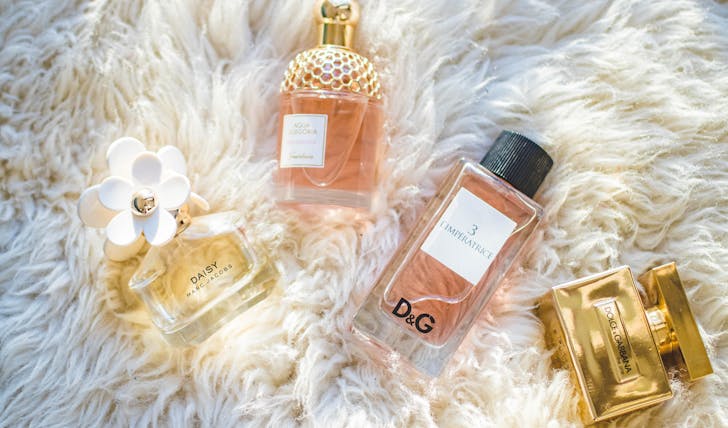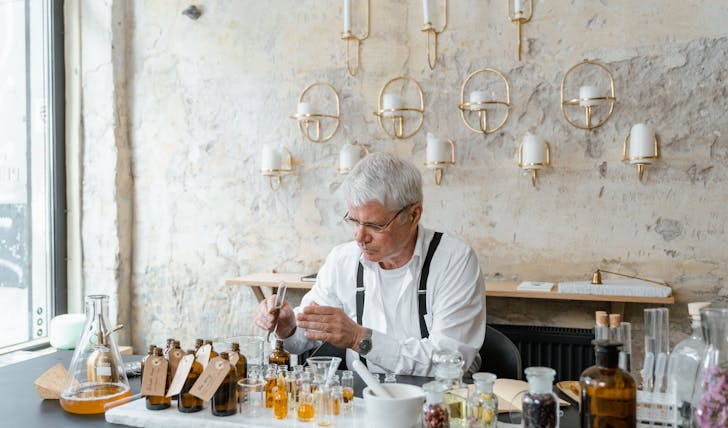At its core, a fragrance is a combination of natural or synthetic ingredients that create a scent. These ingredients can range from flowers and fruits to woods and resins, mixed with alcohol and water to produce the final product.
The world of scents is filled with various terms, but the most common ones you will encounter are perfume, eau de toilette, and cologne. What sets them apart is the concentration of oils in alcohol and water.

Valeria / Pexels / Fragrances are an invisible part of our personal style, and they have the power to evoke memories and emotions like nothing else.
- Perfume (Parfum): The most concentrated form, with 20-30% perfume oil. It is the longest-lasting and also the most expensive.
- Eau de Parfum (EDP): Slightly less concentrated than perfume, with 15-20% oil. It offers a good balance of longevity and strength.
- Eau de Toilette (EDT): With a 5-15% concentration of perfume oil, this is lighter and ideal for everyday wear. It is less intense and typically more affordable than EDP.
- Cologne (Eau de Cologne): The least concentrated among the main types, with 2-4% perfume oil in alcohol and water. Traditionally, cologne refers to lighter, citrus-based scents, though the term is often used in the U.S. to refer to almost any men's fragrance.
Understanding these differences is crucial when selecting a fragrance, as it affects how long the scent lasts and how strong it is.
How to Choose Your Fragrance
Choosing a fragrance is a personal journey, one that should be enjoyable and reflective of your style and personality. Here are some steps and tips to help you find your signature scent.
Start With What You Know
Think about the scents you are drawn to in everyday life. Do you love the smell of fresh-cut grass, spicy cinnamon, or the ocean breeze? Identifying these preferences can guide you towards the types of fragrances you will enjoy.

Ron / Pexels / Perfume, Eau de Parfum (EDP,) Cologne, and Eau de Toilette (EDT) are the four major types of fragrances for men.
However, fragrances are composed of three notes: Top, middle (or heart), and base. The top notes are the initial, lighter smells that hit you first. Middle notes emerge as the top notes dissipate, and base notes are the heavier, lasting scents that linger. Knowing which notes appeal to you can help narrow down your choices.
Try the Fragrance First
Never blind-buy a fragrance based on recommendations. Skin chemistry can significantly affect how a perfume smells on you versus someone else. Department stores and boutiques often offer samples, so take advantage of these.
Wear a fragrance for a few hours to see how it evolves, as the initial scent can change throughout the day.
Consider Your Lifestyle and Personality
Your fragrance should be an extension of your personality and fit your lifestyle. A bold, spicy scent might suit evening events or a confident personality. And a light, aquatic cologne could be perfect for daytime wear or a laid-back individual.

Mart/ Pexels / Do not overuse the fragrance. Instead, go for a couple of light sprays.
Less Is More!
The golden rule of wearing cologne is moderation. You want to be noticed for the right reasons, not to overwhelm everyone in the room. A couple of sprays are usually sufficient.
Heat helps diffuse the fragrance across your body, making pulse points ideal locations. The neck, wrists, and behind the ears are perfect spots. Do not rub the fragrance into your skin. This can alter the scent.
Reapply Wisely
Depending on the concentration, you may need to reapply your fragrance. However, be mindful not to overdo it. A light touch-up is often all that is needed.
Preserve your cologne's integrity by storing it in a cool, dark place. Heat, light, and humidity can break down the fragrance, altering its quality and lifespan.





